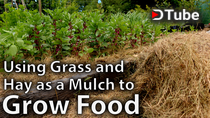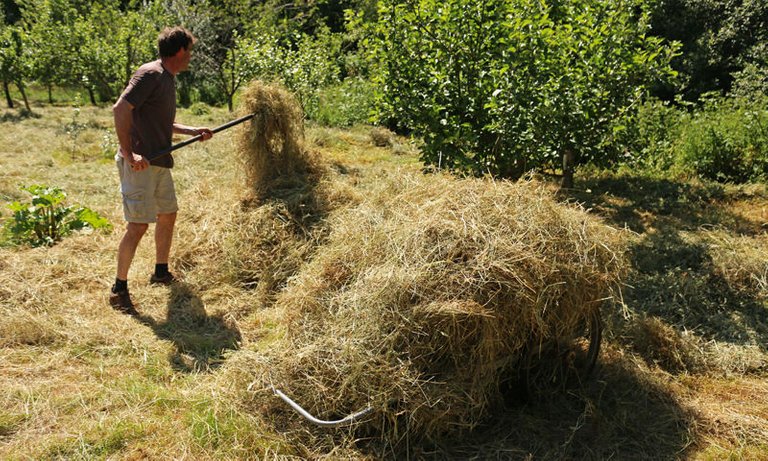
So it is the second week for this DTube series, where at the start of every week I will upload one of my favorite homesteading/permaculture videos from my YouTube channel. This week is all about using hay and grass in the vegetable garden, and I think it will be a good introduction to my video next week which is about scything - something I have certainly fallen in love with over the past few years.
Growing food using hay as a mulch sparks a lot of debate. Often people recommend straw instead of hay because of 'weed seeds' but it all comes down to where you source everything from. We cut our hay in our haymeadows after the flowers and grass have seeded, meaning that there are less seeds to potentially germinate. And should any germinate then they are very easy to remove, or simply apply a thicker layer of mulch.
In many places, grass is so abundant, therefore it makes complete sense to make the most of this fantastic resource. One great thing is that you can use it as a compost material, green or brown. Something I want to experiment with this year in the garden is to see if it is possible to make compost just with grass. By mixing green fresh lawn clippings with hay. It might fail, or even be completely pointless because of efficiency, but I look forward to the experiment.

Here is an image of my dad putting fresh hay into the cart after we had scythed the orchard. The challenge of scything is the work hours needed, but in a day with two of us going at it we could cut the whole orchard. I love scything because of the relaxing sound you get from every cut, it is almost like cutting through tiny splinters of glass.
For our potatoes we either grow them by placing on the soil and piling up a lot of hay, or we will mulch around the plants with fresh grass clippings from the lawn. For around 4 years of using grass and hay in the garden we are extremely impressed with the results. Particularly with how little weed problems we have had. Perhaps this is a half myth, and people who haven't tried it for themselves believe what others say?

Above is a photograph of our broad beans last year. We applied hay as a mulch twice, adding about 3inches (7cm) both times and it was so simple. Virtually no weeding was needed, and pulling out weeds from mulched beds almost always seem a million times easier.
I hope you enjoy this video and that it gives you some confidence to start using grass and hay a bit more in your vegetable garden.
Last week's post in this series: A Permaculture Apple Day of Skill and Produce Sharing at our Homestead
▶️ DTube
▶️ IPFS
I put my first lot of potatoes in some tyre towers (I've done a post on the potato tower myth if you are interested in perusing it :) ) but I had so many potatoes to put in the ground, in the end I threw them in pits (I'd taken soil to use elsewhere) and then covered them with lawnmower clippings. My fingers are crossed I get some decent harvest - but we're going through a drought and most of the plants have keeled over, so who knows.
I do really enjoy following your garden guides, as you keep things simple, and research whether traditional methods could be myth or fact.
I've been trying to locate a secondhand scythe, as my son is interested in using one but they are scarce these days. It would be so useful to be able to make our own hay. Maybe one day... :)
Oh great I shall track that down! Interesting to see what will happen if they do survive. Fortunately grass clippings are pretty good at moisture retention! Thank you so much :) Try and get an Austrian Style scythe if possible. Oh making your own hay is great fun, I will b posting a video about it soon actually. Best wishes
great to see that people like you are spreading the knowledge of a self-sufficient lifestyle. Especially in the field of nutrition.
Thank you very much:)
@huwsnursery I love this video! It's such a Brilliantly simple but effective idea!
Thank you as always @mrbloom
I totally agree on using hay. My only question is whether is might encourage increases in slugs?
Great stuff! I'm trying to move along similar lines, too: when I took over my land it was covered in 6 feet tall grass which I cut and stacked in piles along the edges of each field. I then cut it up as fine as possible with my brushcutter (if you pile up the grass so the fibres all lay in the same direction, it's relatively easy) and move it onto the newly formed beds which I then cover with black tarps to help it decompose. What's left over I either spread around as mulch or have been trying to get to compost on site by adding nitrogen. Either way, I'm convinced that I don't need outside nutrients: if I can just get the exchange right, all I should have to do is move nutrients around, letting them balance out where needed and speeding up their natural decomposition.
I never thought of grass as a resource but it essentially is. And a very abundant one too!
When I mow the lawn I dump the clippings in my garden mostly because I feel bad sending this biodegradable material to a landfill by putting it in my garbage. It makes for an effective mulch when you have enough, and it grows so fast you can cover your whole garden with a thick layer in a matter of weeks. A thick layer will prevent weeds from growing and will also keep the bed from drying out.
I am so delighted to see you on this platform!!! I am subscribed to your YouTube page, but I am grateful to find you on Steemit now! Following!
Congratulations @huwsnursery! You received a personal award!
Click here to view your Board
Do not miss the last post from @steemitboard:
Congratulations @huwsnursery! You received a personal award!
You can view your badges on your Steem Board and compare to others on the Steem Ranking
Vote for @Steemitboard as a witness to get one more award and increased upvotes!